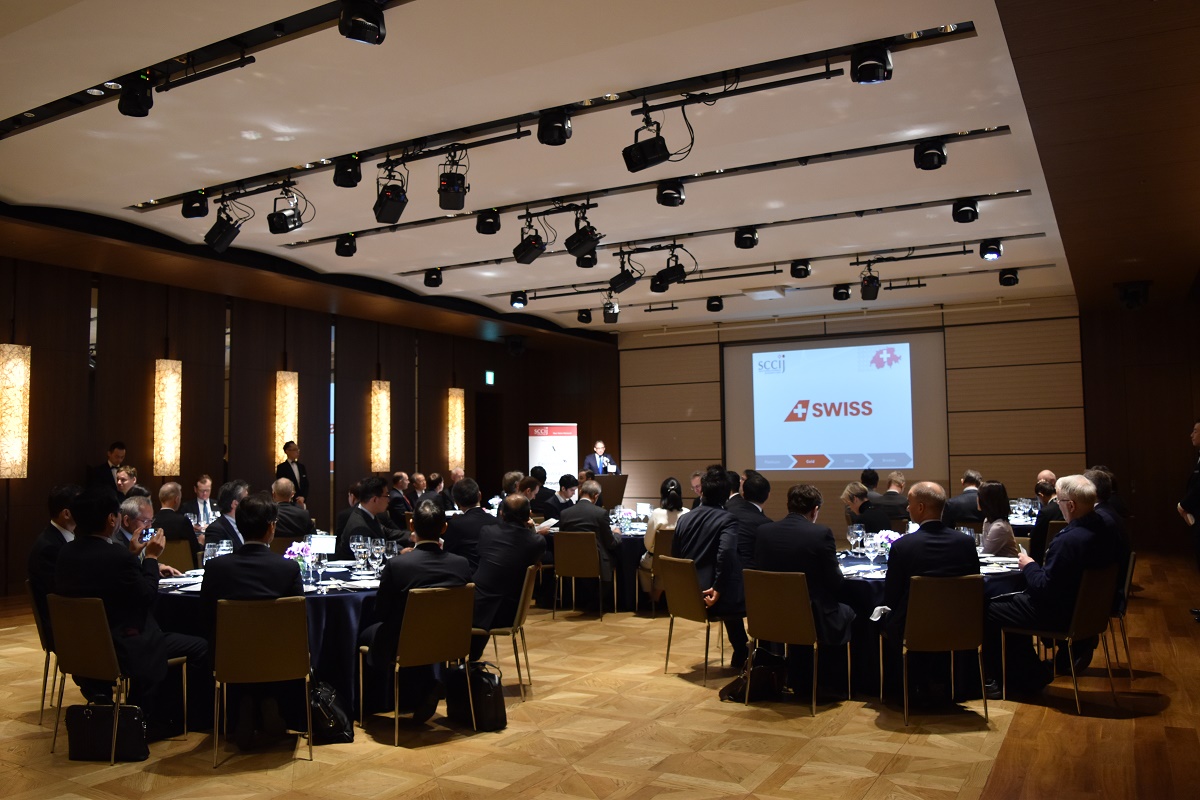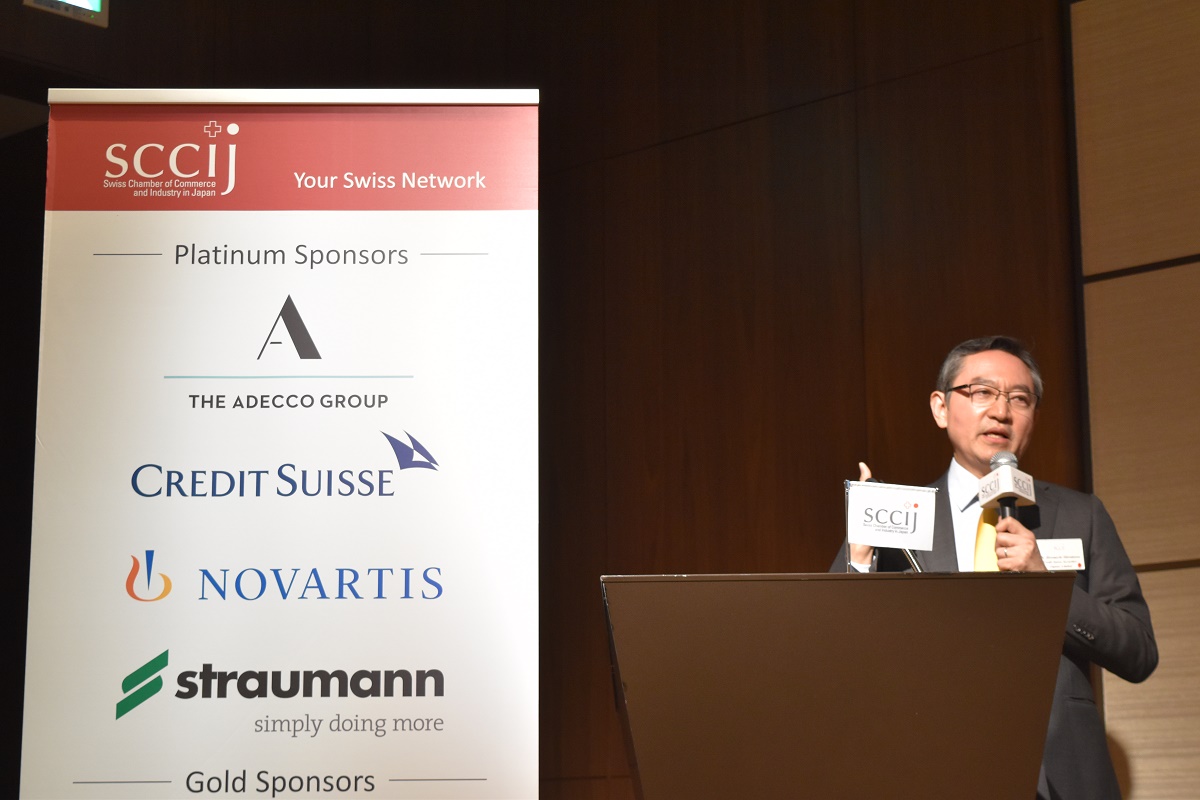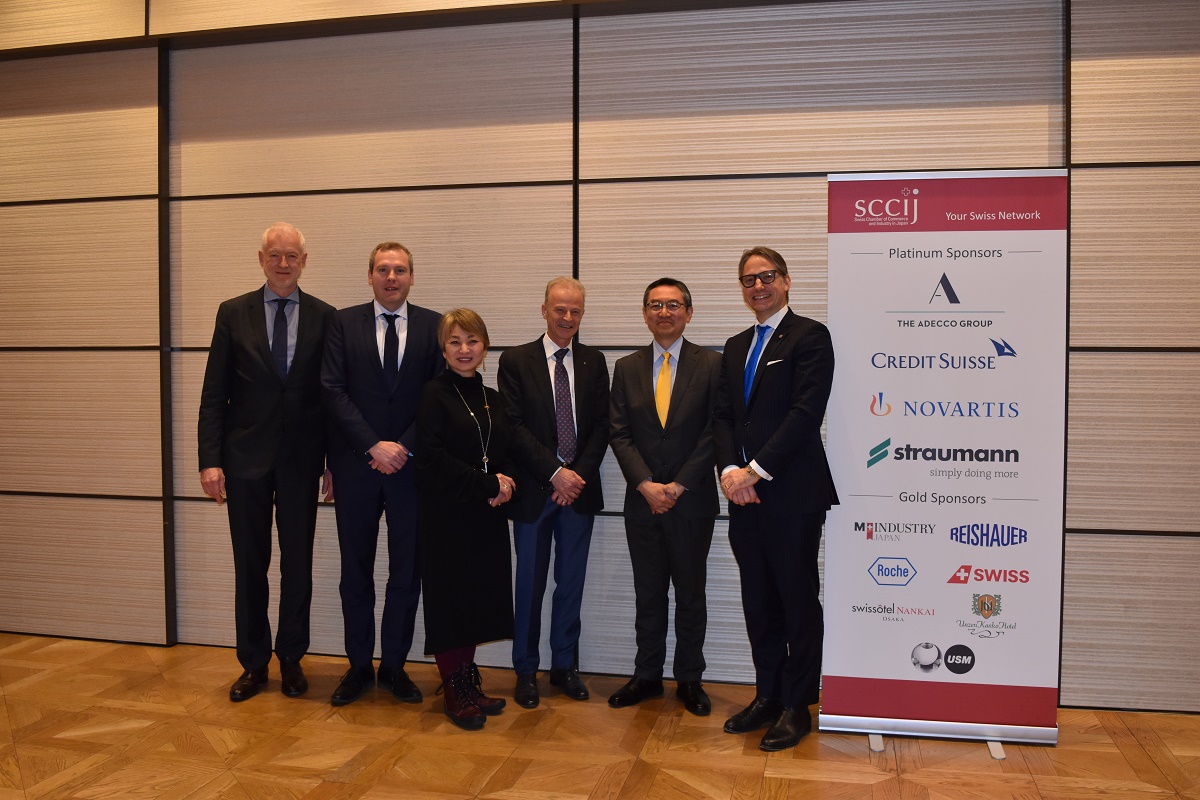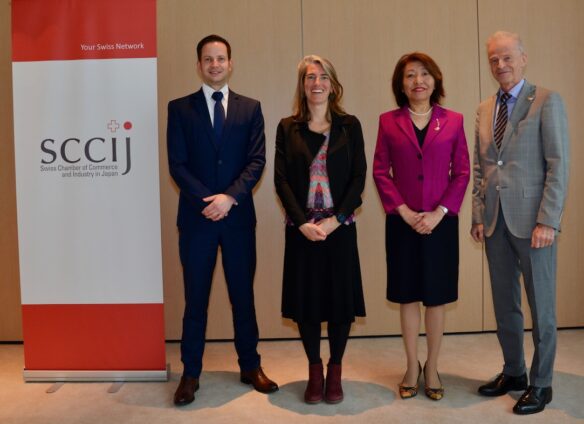Tokyo (SCCIJ) – At the January luncheon, Dr. Hiromichi Shirakawa, Head of Economics Japan & Chief Economist at Credit Suisse Japan, warned more than 50 members and guests of the SCCIJ about the need to be prepared for a scenario in which Japan will be more directly involved and impacted by the trade disputes which were kicked off during the year 2018. Besides the issue of US-Japan auto trade imbalances, close attention would also be required to how the Bank of Japan’s ultra-easy monetary policy and the scheduled value-added tax hike will pan out, the renowned economist said. In this context, the course of the Japanese yen had to be observed as well. The SCCIJ January Luncheon is traditionally used for the presentation of the annual economic outlook of a Swiss bank in Japan.
Outlook for the Japanese yen
“The recent instability of stock markets including Japanese markets has been accompanied by the deterioration of China’s economic performance,” Dr. Shirakawa stated at the beginning of his luncheon talk. Chinese economic data broadly would seem to suggest a near-term slowdown in economic activities.
For example, China’s exports dropped in December and its producer prices and corporate profits also turned southwards. The decline of manufacturing orders from China was mirrored by a decline of the main US stock index S&P 500. If the US decides on hiking the import tariff, downward pressures on China’s manufacturing industry might get more severe, Dr. Shirakawa warned.

SCCIJ January Luncheon
He showed a diagram about Japan’s exports: 19% go to China, 25% to Asia, 19% to the US and 11% to the European Union. “We are concerned about a potential adverse impact on the Japanese economy as it is highly exposed to China and the rest of Asia if the trade disputes continue or escalate,” he said.
The ongoing manufacturing uncertainty is expected to lead to a pause of interest rate hikes in the US. In an anticipation of this, the two-year rate differential between Japan and the US has declined, which resulted in the appreciation of the yen. “In this context, the risk of a further yen appreciation has increased because the Bank of Japan is likely to only take a wait-and-see mode,” Dr. Shirakawa argued.
US-Japan trade negotiation
At the same time, the US and the Japanese authorities are likely to welcome an orderly appreciation of the yen amid the changing expectations for the US rate outlook, the Credit Suisse economist predicted. He pointed at the sources of the US trade deficit: 46% of US trade deficit is caused by China, 19% by the European Union, 10% by Mexico and only 8% by Japan. Also, Japan’s goods trade balance has declined recently and even turned negative.
Another factor in the trade negotiations may be the expectation of the US administration that Japan will support the US initiatives on protecting intellectual property and preventing forced technology transfer. One buzzword in this context is Huawei. “Whether or not Japan can convince the US in this respect will affect the dynamics of US-Japan trade negotiation”, Dr. Shirakawa argued.

SCCIJ January Luncheon speaker Dr. Hiromichi Shirakawa, Head of Economics Japan & Chief Economist at Credit Suisse Japan
Postponement of VAT tax hike?
A third factor determining the atmosphere and direction of the trade negotiation would be the outlook for private consumption in Japan. The speaker showed diagrams that real employee compensation has recently peaked, and consumption has declined, whereas households have increased their saving rate.
“The US authorities seem to remain inclined to put pressure on Japan to boost household consumption – meaning higher (US) imports – and hence favor the postponement of the second VAT hike in October 2019, the Credit Suisse economist suggested.
Hence, there would be a 40-50% chance for the Japanese government to postpone the VAT hike. “The logic behind it is that a postponement would let Japan’s consumption grow rather strongly”, he said. The domestic event schedule with a rather celebratory mood due to the change of emperor and the Upper House election in July would also underpin consumer confidence.
Changing immigration policy
According to Credit Suisse calculations, out of about 4.7 million jobs created under the “Abenomics”, foreigners have taken up roughly 1.0 million. As the domestic source of labor supply is expected to dry up eventually with women’s labor participation rate already at 52-53%, the economy would increasingly need to rely on immigrants, forcing the government to continuously open the labor market, Dr. Shirakawa predicted.
“We expect a net annual increase of the number of foreign workers to speed up from around 200,000 to 300,000 in the near future”, the Credit Suisse Chief Economist said. Importantly, an increasing number of immigrants would not only ease a labor shortage problem, but also decelerate the pace of population shrinkage. Hence, these structural headwinds for the economy would blow weaker, he said.
There is also a negative side of this development. “More immigration may delay necessary industrial reforms and technology innovation and keep labor market mobility low”, the SCCIJ January Luncheon speaker warned. Another potential result of more immigration could be social unrest, Dr. Shirakawa anticipated.

SCCIJ Executive Committee members and advisors with Luncheon speaker Dr. Hiromichi Shirakawa
Biography of the Speaker
Dr. Hiromichi Shirakawa joined Credit Suisse Securities (Japan) Limited in April 2006 as Managing Director, Chief Economist and Head of Economic Research Department for Japan. From November 1999 to March 2006, Dr. Shirakawa was Chief Economist at UBS Securities Japan. In June 2017, Dr. Shirakawa was appointed Vice Chairman of Credit Securities (Japan) Limited in addition to his existing role as Chief Economist for Japan.
Dr. Shirakawa started his professional career at the Bank of Japan in 1983. He spent about 16 years at the Bank, mainly in charge of research and analysis of money and credit markets. He was a special assistant to the governor in 1997-1998 when the country was in the middle of banking crisis. From 1991 to 1994, Dr. Shirakawa was a senior economist at the Organization for Economic Co-operation and Development (OECD), based in Paris. He holds a B.A. in Economics and a Ph.D. in Policy Studies.
Text: Martin Fritz for SCCIJ; Photos: SCCIJ





























